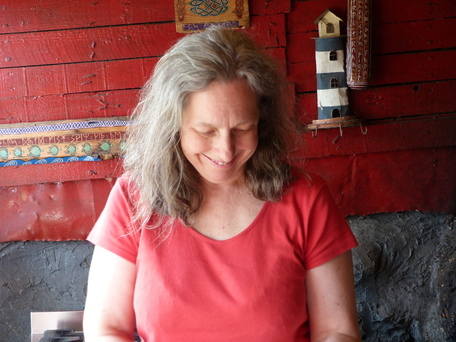ROYAL MACNAB - THE TITLE
Posted on
In contrast to Celtic Fringe, which was only christened with a title when the book was finished, Royal Macnab was shaped by its title – or rather, by the meaning of the title.
By the time I started writing, I had been cooking on the local sporting estates for four or five years, and thought there was probably a book in it. It’s a closed world not seen by many people, and is an odd time warp, a throw-back to the days when the upper classes could afford to run stately homes without opening them to the public, and supporting the enterprise with cheap labour – going into service was a family thing for many that went back generations.
The research began with my own experiences of working as a cook on four estates, the people I encountered, the stories I heard and saw, and the landscapes that formed the backdrop to the kitchens where I cooked. Being married to a game fishing fly tier and wild trout fisherman didn’t hurt either – my husband’s technical knowledge of tackle and waters, tactics and technicalities was a great help throughout the four-year process of putting the book together.
The theme has been explored in Isabel Colegate’s excellent The Shooting Party, a sharply observed book built around the class differences existing between upstairs and downstairs, and more recently in Gosford Park, a fabulously intricate and rich original screenplay that explored a variety of tensions between the guests invited to shoot at a country house, and the staff who serve them.
Both stories were set between the Great War and the Second World War, and although grouse shooting formed part of the backdrop in both these tales, the main concentration was on the social order. As well as writing about the interface between guest and estate workers, I wanted to integrate the processes of stalking deer, shooting game birds and fishing for salmon, the management of estate wildlife as well as property.
It seemed to me that a story set in a similar environment, but in modern times, might offer some new ground – the social order had gone through radical changes and the sporting estates constitute a weird hangover from the Jeeves and Wooster heydays. Instead of people spending a lifetime in service, there were young people hired in for the sporting season, many of them travelling, between school and university, or earning tuition fees during college breaks, waiting on wealthy guests with backgrounds in industry and commerce as well as titles.
In addition, the history of the English country house, while it had parallels, did not reference a vital part of the historic backdrop to the Scottish sporting estates – the clearances of the 18th and 19th centuries. The estate I cooked at most frequently during the eight years I worked as a lodge cook was not a country house converted to the purpose of country pursuits; rather, it was purpose built for it, created to capitalise on the rich salmon resources of the river on which it lies.
In a John Buchan story set between the wars, John Macnab, I found more pieces of the puzzle I was slowly fitting together. A group of bored gentlemen on holiday in the Highlands set themselves the challenge of poaching a deer, a brace of grouse and a salmon over a period of five days, from neighbouring estates. It’s all great fun and very gentlemanly, and is the root of the Macnab, still attempted today, with the difference being that the deer, grouse and salmon must be caught within a day.
One day in the kitchen, I was listening to a ghillies’ conversation when I heard the mention of a Royal Macnab. I didn’t know what it was and was delighted to be told that it constituted the same sporting challenge as a Macnab, with the added stipulation of bedding the lodge cook. It was one of those great moments when a writer, having a mass of murky ideas mulling around, suddenly sees a clear way forward.
